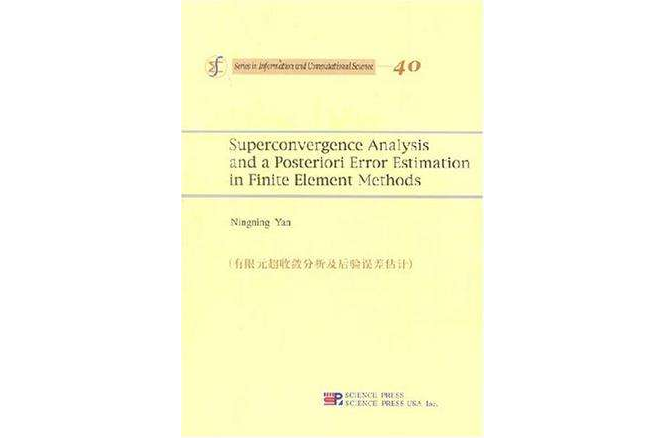《有限元超收斂分析及後驗誤差估計》是1970年科學出版社出版的圖書,作者是NingningYan。
基本介紹
- 書名:有限元超收斂分析及後驗誤差估計
- 作者:Ningning Yan
- ISBN:9787030212993
- 頁數:229
- 定價:58.00元
- 出版社:科學出版社
- 出版時間:1970-1
內容簡介
目錄
- Contents
Chapter 1 Basic framework 1
1.1 Preliminaries 1
1.2 Model problem 3
1.3 Integral identity 5
1.4 Global superconvergence analysis 9
1.4.1 Superclose analysis 9
1.4.2 Global supperconvergence 10
1.4.3 A posteriori error estimate 13
1.5 Brief summary and notes 14
Chapter 2 Integral identities 16
2.1 Billnear rectangular element 17
2.1.1 Integral identity for 17
2.1.2 Integral identity for 20
2.1.3 Integral identities for and 22
2.1.4 Summary 24
2.2 General results for bilinear elements 25
2.2.1 General elliptic bilinear form of order two 25
2.2.2 Bilinearte element on general domain 27
2.2.3 Regularlocally refined mesh 31
2.3 Rectangular Lagrange elements of order p 35
2.3.1 Integral identity for 36
2.3.2 Integral identity for 39
2.3.3 Integral identity for 42
2.3.4 Integral identities for 44
2.3.5 General elliptic bilinear form 46
2.4 Rictangul finite elements witederivative degrees of freedom 47
2.4.1 Bicubic Hermite element 47
2.4.2 Adini element 51
2.5 Reetangular mixed finite elements 57
2.5.1 Mixed finite element for Stokes equation 57
2.5.2 Mixed finite element for elliptic equation 63
2.5.3 Mixed finite element for Maxwell equation 69
2.6 Summary of integral identities 74
Chapter 3 Superconvergence Analysis 77
3.1 Elliptic partial differential equations 77
3.1.1 Poisson’s equation 77
3.1.2 Elliptic equation of order two (agrange element) 81
3.1.3 Elliptic equation of ordar two (Adini element) 85
3.1.4 Singularproblem 86
3.1.5 Coupling of different finite element spaces 88
3.1.6 Elliptic equation of ordarfour 92
3.2 Nonconforming finite elements 94
3.2.1 Elliptic equation of ordartwo 94
3.2.2 Elliptic equation of order four 99
3.3 Evolution partial differential equations 102
3.3.1 Parabolic equation 102
3.3.2 Hyperbolic equation of order two 104
3.3.3 Integral-differential equation 105
3.3.4 Other evolution partial differential equations 110
3.4 Hyperbolic equation of order one 114
3.4.1 Standard finite element scheme 114
3.4.2 Streamline diffusion meteod 117
3.4.3 Discontinuous Galerkin method 118
3.5 Mixed finite elements 121
3.5.1 Elliptic PDE of order two 121
3.5.2 Elliptic PDE of order four 123
3.5.3 Stokes equation 129
3.5.4 Maxwell’s equation 131
3.6 Integral equations 136
3.7 Optinal control problems 137
3.8 Summary of superconvergence analysis 144
Chapter 4 More discussions on high accuracy analysis 149
4.1 Global superconvergence 149
4.1.1 Interolation post-processing 150
4.1.2 Global supteconvergence 153
4.1.3 Summary of global superconvergence 155
4.2 Extrapolation 156
4.3 Defect correction 161
4.4 Local superconvergence 164
4.5 Ultraconvergence 166
4.6 Eigenvalue problems 170
4.7 Nornarical examples 172
Chapters A posteriori error estimates 177
5.1 Introduction 177
5.2 Residual type a posteriori error estimate 178
5.3 Recovery type a posteriαd error estimate 186
5.4 Equivalence of recovery type estimator 190
5.5 Asymptotically exactness of recovery type estimator 193
5.6 Some remarks on two kinds of estimators 196
5.7 A posteriori error estimate for optimal control problems 197
5.7.1 Model problem 197
5.7.2 Residual type a posteriori error estimate 199
5.7.3 Recovery type a posteriori arror estimate 207
5.8 Nornarical examples 212
Bibliography 219

